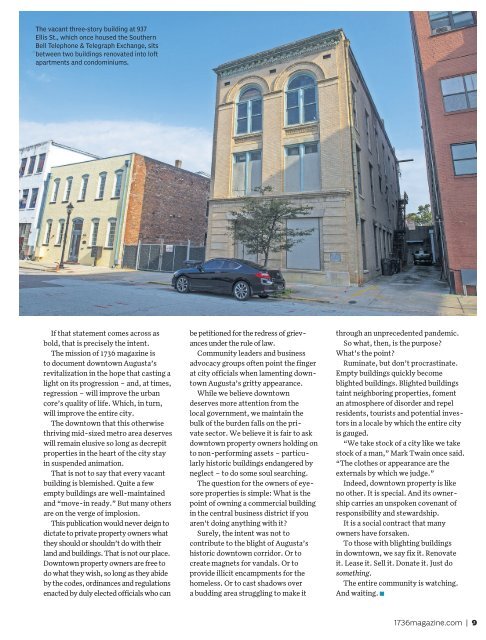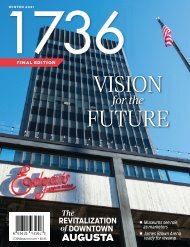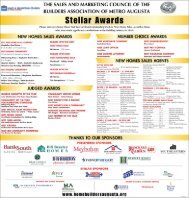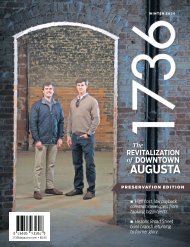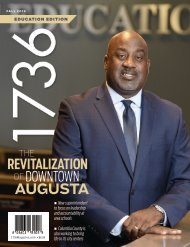Fall 2020 - 1736 Magazine
You also want an ePaper? Increase the reach of your titles
YUMPU automatically turns print PDFs into web optimized ePapers that Google loves.
The vacant three-story building at 937<br />
Ellis St., which once housed the Southern<br />
Bell Telephone & Telegraph Exchange, sits<br />
between two buildings renovated into loft<br />
apartments and condominiums.<br />
If that statement comes across as<br />
bold, that is precisely the intent.<br />
The mission of <strong>1736</strong> magazine is<br />
to document downtown Augusta’s<br />
revitalization in the hope that casting a<br />
light on its progression – and, at times,<br />
regression – will improve the urban<br />
core’s quality of life. Which, in turn,<br />
will improve the entire city.<br />
The downtown that this otherwise<br />
thriving mid-sized metro area deserves<br />
will remain elusive so long as decrepit<br />
properties in the heart of the city stay<br />
in suspended animation.<br />
That is not to say that every vacant<br />
building is blemished. Quite a few<br />
empty buildings are well-maintained<br />
and “move-in ready.” But many others<br />
are on the verge of implosion.<br />
This publication would never deign to<br />
dictate to private property owners what<br />
they should or shouldn’t do with their<br />
land and buildings. That is not our place.<br />
Downtown property owners are free to<br />
do what they wish, so long as they abide<br />
by the codes, ordinances and regulations<br />
enacted by duly elected officials who can<br />
be petitioned for the redress of grievances<br />
under the rule of law.<br />
Community leaders and business<br />
advocacy groups often point the finger<br />
at city officials when lamenting downtown<br />
Augusta’s gritty appearance.<br />
While we believe downtown<br />
deserves more attention from the<br />
local government, we maintain the<br />
bulk of the burden falls on the private<br />
sector. We believe it is fair to ask<br />
downtown property owners holding on<br />
to non-performing assets – particularly<br />
historic buildings endangered by<br />
neglect – to do some soul searching.<br />
The question for the owners of eyesore<br />
properties is simple: What is the<br />
point of owning a commercial building<br />
in the central business district if you<br />
aren’t doing anything with it?<br />
Surely, the intent was not to<br />
contribute to the blight of Augusta’s<br />
historic downtown corridor. Or to<br />
create magnets for vandals. Or to<br />
provide illicit encampments for the<br />
homeless. Or to cast shadows over<br />
a budding area struggling to make it<br />
through an unprecedented pandemic.<br />
So what, then, is the purpose?<br />
What’s the point?<br />
Ruminate, but don’t procrastinate.<br />
Empty buildings quickly become<br />
blighted buildings. Blighted buildings<br />
taint neighboring properties, foment<br />
an atmosphere of disorder and repel<br />
residents, tourists and potential investors<br />
in a locale by which the entire city<br />
is gauged.<br />
“We take stock of a city like we take<br />
stock of a man,” Mark Twain once said.<br />
“The clothes or appearance are the<br />
externals by which we judge.”<br />
Indeed, downtown property is like<br />
no other. It is special. And its ownership<br />
carries an unspoken covenant of<br />
responsibility and stewardship.<br />
It is a social contract that many<br />
owners have forsaken.<br />
To those with blighting buildings<br />
in downtown, we say fix it. Renovate<br />
it. Lease it. Sell it. Donate it. Just do<br />
something.<br />
The entire community is watching.<br />
And waiting.<br />
<strong>1736</strong>magazine.com | 9


